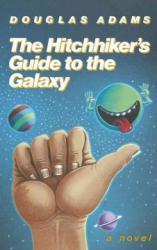
The Hitchhiker’s Guide to the Galaxy by Douglas Adams is witty, genius, and an example of common English humor: dry, but hilarious.
Seconds before Earth is blown away to make way for an intergalactic freeway, Arthur Dent discovers galaxies and planets, lightyears beyond his own. He hitches a ride with his best friend, Ford Perfect. Ford is a cleverly disguised alien, who has been stranded on Earth for the past 15 years as he writes a revised guide to the galaxy. Arthur and Ford happen to hitch ride with the most disagreeable and intolerable creatures, the Vogon. They are then discovered and thrown into the soul-sucking abyss of space. Seconds before they suffocate, Ford and Arthur are picked up by a recently stolen ship, stolen by the president of the galaxy, Zaphod Beeblebrox, and his girlfriend, Trillian. The ship is on an improbability drive, which is why they crash land on a long believed mythical planet, called the Heart of Gold.
The planet was in a hibernation-like state, and has only just awoken recently. Trillian, Ford, and Zaphod explore while Arthur meets Slartibartfast, who explains that the Earth was a test, run by mice, to discovery the Question of Life, since they know the answer is 42. However, Earth was destroyed seconds before test completion. Trillian, Zaphod, and Ford are captured by the mice and kept in a dream-like prison. That is, until Arthur is brought to the mice and the group is reunited. The mice explain that they are interested in harvesting Arthur’s brain as organic evidence.
So, naturally, the group manages to escape in the knick of time, avoiding both the mice and the galaxy police, who are searching for Zaphod.
Reviewer Grade: 7
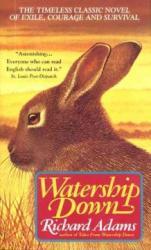
In an ever-increasing list of books I failed to read as a child, I finally managed to get to Watership Down. While I am aware that many people speculate the true meaning of the book to be an allegory for Nazis or Communism, or whatever, the prologue provided by the author in this edition stated that it was merely a bedtime story for his children. With this in mind, I’m sure many subconscious influences led to some of the themes in Watership Down.
Either way, the story seemed to be a rambling series of events that didn’t have much of a point or purpose.
Let’s be clear: I like rabbits. I think they’re cute, and I even own two of them. Therefore, I appreciate the little details of lagomorph mannerisms sprinkled throughout. And yet, there were a few confusing choices made in this book, like giving a somewhat-confusing “rabbit language” that rarely had context, and was mostly abandoned by the end of the book. I also couldn’t buy into the idea of a “rabbit army” since most of the rabbits I’ve seen in the wild have been mostly solitary animals, and hardly in the numbers described in Watership Down.
When it comes right down to it, the thing that perhaps disturbed me the most about this book was the anthropomorphism of the rabbits. Sure, the “side stories” about El-Ahrairah were distracting and often unnecessary, and I couldn’t honestly tell you the character traits or attributes of any of the numerous rabbits, but the fact that they could talk to each other made them seem somewhat human. Consequently, this then introduces ideas like war and sex trafficking via the “innocent” covering of rabbits. I feel these tend to be mostly human traits, so it pulled me from the story when I had to remind myself, “Wait, these are rabbits.”
A meandering story that puts humans in rabbit bodies, I give Watership Down
2.5 stars out of 5.
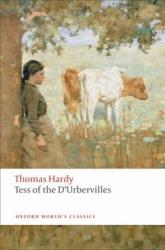
Written in the Victorian Era, Tess of the d’Urbervilles by Thomas Hardy follows the story of Tess Durbeyfield and her tragic downfall. When Tess’s father discovers that he is the descendant of an ancient noble family, the d’Urbervilles, he sends Tess to the d’Urberville mansion hoping that Mrs.
d’Urberville will make Tess’s fortune. After being forced to take a job at the mansion to provide for her family, Tess is taken advantage of by Alec d’Urberville and is forced to live in shame and exile. After meeting a man named Angel Clare, Tess and Angel fall in love, but Tess has neither the strength nor the heart to tell Angel of her shameful secret. When she finally does, her secret tears their relationship apart, but will their love triumph over this “sin” ? This novel by Hardy truly reveals the division of men and women during the Victorian period and how a sin commited by a woman, even if not by her own fault, had everlasting consequences back then. I recommend this book to mature readers, as there is mature content and sexual references, but I highly recommend reading it because it holds both culture and themes that are present even in modern society.
Reviewer Grade: 12
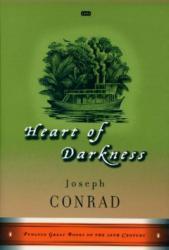
What is the Heart of Darkness? Is it a metaphorical thing such as thoughts and mindsets, or is it a literal tangible place? Joseph Conrad’s novel follows the story of Marlow, an introspective sailor, who recounts his journey up the Congo River to five men who are on the same ship as Marlow:
the Director of Companies, who is also the captain and host, the Lawyer, the Accountant, Marlow, and the unnamed Narrator. What’s interesting is that the story is told from the point of view of the unnamed narrator who is conveying to the readers what marlow is telling him. Marlow explains in detail of his journey into the African Continent and his venture up the Congo River. He tells of acts of imperialism, acts of racism, and acts of evil commited within the region. The Heart of Darkness has gained much praise and criticism since its release, nevertheless it explores Conrad’s view of evil and darkness, but also leaves it up to the reader to make their own conclusion. I recommend this novel to readers who are seniors in high school or above because this novel is extremely difficult to read as Conrad’s style is very complex. To fully experience the novel, one must read it multiple times.
Reviewer Grade: 12
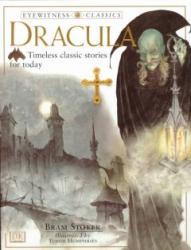
Twilight, Count Von Count, Nosferatu, where do all of these vampire themed genres come from? Also, where do all the vampire cliches come from? I mean why do they hate garlic, can only be killed with a steak through the heart, and have no reflection in a mirror? All of this goes back to the novel Dracula by Bram Stoker. This 1897 gothic horror novel was written during the Victorian Era, a period many consider of high etiquette and stern morality.
The best part about this novel is that there is no one point of view, the story is written in segments of diary entries and newspaper articles. We get to see the story from multiple characters’ views, which is absolutely phenomenal because it creates dramatic irony and suspense. In Dracula, we follow the story of 7 people as they discover the existence of Count Dracula as a vampire. When one of the 7 become a victim of the Count, the rest set out to exterminate the Count and rid him of the world. I recommend this book to all readers (high school and above as the vocabulary and style is somewhat
difficult) as this teaches all of us about the evolution of contemporary culture and the culture of the Victorian Era. Reviewer Grade 12.
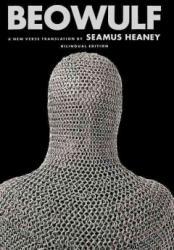
The mighty hero triumphs over evil and saves the people from utter destruction. Sound familiar? Of course it does, it’s the basic plot line of the cliche hero’s tale that everybody knows. However, all of these tales most likely spawned from Beowulf, the oldest surviving English poem written in Anglo - Saxon around the 11th Century A.D. Beowulf is an epic poem that begins with Hrothgar, King of the Danes. Hrothgar’s people live in peace when they are attacked and threatened by a monster named Grendel, who kills off the Danes everynight in their mead-hall, Heorot. So in comes Beowulf son of Ecgtheow, a mighty warrior from Geatland who promises to defeat Grendel and bring prosperity back to the Danes. Beowulf is an amazing poem as it not only tells the classic tale of the epic hero and his journey, but contains hidden meanings aside from literal. Beowulf has no known author, but contains elements of factual history, which tells us this may be a tale describing actual events. This piece of literature is a traditional master piece and should be preserved as an example of how words and tales can evolve over decades. Reviewer Grade 12.
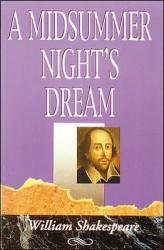
A Midsummer's Night Dream is one of Shakespeare's many plays that he wrote. Unlike many of his works, this one does not have a sad and tragic ending, and is a drama more than anything. The story is about four lovers Hermia, Helena, Lysander, and Demetrius. There is a whole love triangle where Hermia loves Lysander, but is forced to marry Demetrius, who Helena loves. For Hermia to escape getting married to someone she doesn't love, she and Lysander run off into a forest where they are outside the law. Already in the forest, there is drama going on between two faeries, Oberon and Titania. Titania is protecting an Indian boy that Oberon wants, so Oberon gets his faerie Puck to go receive a love potion, so that Titania will now be distracted by love and Oberon can snatch the Indian child. Back in the city however, there is a group of actors organizing a play. After one of them tries to take up every part in the play, they get it all organized and head off to the forest to practice. So already in the first act we got everybody running off to the forest to cause drama. This play shines at how good its humor is, and is jammed pack with drama. I would recommend anyone to read this fancy story.
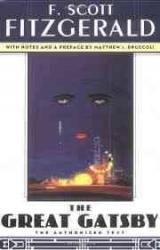
The Great Gatsby takes place during the Roaring 20’s in New York before Prohibition was ended. Gatsby hosts parties where he also gives out alcohol to his guests. I did not like this book at all because I didn’t like the love story between Gatsby and Daisy, frankly, I didn’t really like any of the characters to begin with. I think it might’ve been probably because I personally have higher morals than the characters show during this time period. I didn’t like the way Nick was used and quite honestly taken advantage of by Tom, Daisy, and Gatsby. What I disliked the most about this book is the psychotic obsession Gatsby has for Daisy because she’s his “dream.” If he has a clear mind, he’d notice that he couldn’t be in love with a lesser human being. I think all of his achievements to get to where he was, a wealthy popular man was all a waste because it was all for someone who didn’t have the equal affection in return for him. I also didn’t like how loose everybody is in the story. I thought it was sad how because Gatsby’s couldn’t see how his “dream” later became unattainable and nonexistent. I don’t recommend this book as there was hardly a turning point and it seemed to linger in unresolved conflict. I think this book suits a much older audience as it is quicker pace and sometimes hard to follow, and also for it’s immoral content.
Reviewer Grade: 11
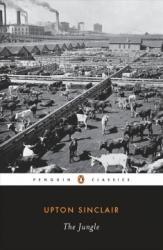
This book I picked to read for a summer book report on a fiction American novel. The book was recommend to me by my mom who had read the book a few years earlier in a college catering class. The book describes the story of Jurgis who moved to America from Lithuania in search of a better life. The story goes on to discuss the flaws of the food and meatpacking industry and the poor working conditions. The struggles of the everyday American man are revealed along with the unsanitary process of meat packing. The book was unpredictable as Jurgis is faced with one problem after another not only within the food industry but with the constant life of struggling to keep himself and family alive with little to no money. The book was very depressing and may not be the first choice of those looking for a heroic or uplifting story. The story was never boring and there was never a time that something new wasn't being introduced into the book that added more to the story every second. The historical aspects found in the book are very accurate considering that one of Upton Sinclair's closet friends was Mother Jones who was a huge part in the labor movement during the 1900s. The book was also interesting in the fact of how much America has changed throughout the years and it what ways it is still the same and not much has been done. The book did help me throughout the rest of the year in both English and US history classes to understand the lives in which the everyday American lived. I found this book very interesting and fun, especially for a summer reading, and I would recommend it to anyone looking to take a trip into the 1900s.
Reviewer Grade:11
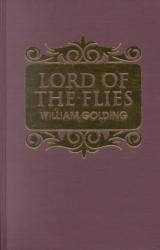
The book "The Lord of the Flies " is a book about a group of boys who crash land on a deserted island. The boys are from ages 5-12. This novel basically shows what would happen if children were to live without adults. The whole theme of the book is "loss of innocence/civilisation/humanity/etc." At first the children have a leader, a signal fire, a meeting place, hunting party, etc. But after they've been around each other for too long things start to escalate and all of the order/organisation is thrown away. I liked this book because there were a lot of hidden meanings to all of the objects AND the children. For example in the book there is a conch shell the boys use to call each other in for a meeting on the beach and it represents law, order, and power. Another example is the signal fire. It represents rescue. I read this book because it was required by my freshman literature and composition class. But if I didn't have to read it I would've read it on my own. Some things I liked about this book were the hidden meanings. I didn't like how some parts were very boring.
Reviewer Grade:9
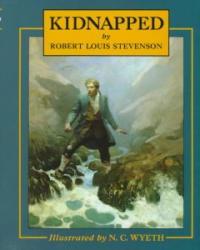
Another one of those “short adventures” that I have finally gotten around to reading, Kidnapped doesn’t suffer from some of the attributes that I found irritating about Captains Courageous . Sure, some of my qualms with Captains Courageous came from the audiobook itself but Kidnapped managed to have an easy-to-understand narrator as well as some sound effects and music that added to the experience of the book. As for the book itself, Kidnapped is pretty basic despite its title being only a small fraction of its plot.
Even despite its short length, a lot happens in Kidnapped. Aside from the obvious kidnapping, many events transpired because of it, including escaping and returning home. Of course, partly because of the short length of the book, the action moves at a pretty quick pace that was sometimes difficult to follow (which may also be an artifact of the time when it was written). The language in this book was easy to understand and is appropriate for young boys who want to dip their toe in the wide world of reading.
Part of me almost wanted the plot to focus more on the kidnapping since that’s what I expected the book to be about. Of course, perhaps my preferences are tainted by modern literature and the almost over-explanation of situations and scenarios. Kidnapped does a lot, but if it went more in depth with a few of the main points, it could have been a little more fascinating. As it is, the kidnapping itself happens so quickly that the reader hardly has time to understand what has happened before the main character has escaped. A little more time spent in the midst of the kidnapping would have added some excellent tension to an already adequate book.
A good short story for all ages, I give Kidnapped 3.5 stars out of 5.
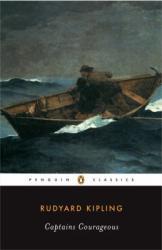
Captains Courageous is one of those classics that I just haven’t read, for whatever reason. I got the sense it was about being at sea, probably in the same vein as Moby-Dick or Treasure Island. And yet, I don’t know if I could tell you what happened in this book. Sure, the main character was picked up by a fishing vessel, and eventually, they learned how to deal with the harsh job of being a fisherman, but that’s pretty much it. The series of fishing adventures seem to be loosely tied together, and the overarching plot was weak at best.
Part of me wonders if the audiobook version of this classic was to blame. Not only did the narrator have a bit of an accent, but she did all the different dialects of the various characters based on their ethnic origins. While I would usually love this attention to detail, more than half the time, I could hardly understand what was being said. Furthermore, the amount of sailing/fishing jargon this book had completely lost me at times, as I have no experience or knowledge of this profession to understand what the characters are talking about.
The two aspects I did enjoy as part of this audiobook were the songs and the length. While I likely would have just read the lyrics of these sea shanties in the book with no understanding of how the tune would go, the narrator sang these songs, thus allowing me to appreciate them more than just the words would have provided. Secondly, while I didn’t understand what was going on for most of the time I was listening to this audiobook, it was still a short book. Therefore, I didn’t waste too much time listening to this book and could move on to different books that much quicker.
A classic that probably hasn’t aged well with time, I give Captains Courageous 2.5 stars out of 5.
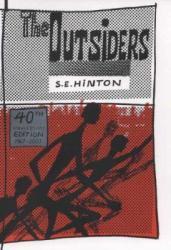
The Outsiders is a beautiful coming of age story that I would recommend for everyone in middle school and high school. The book’s plot is about the rivalry between the Greasers and Socs (focusing on the Greasers). The Socs are the rich, popular kids while the Greasers are the poor, bad kids. The story is about social status, growing up, finding yourself, and rebellion.
Anyone in middle/high school can relate to this book in one way or another.
The problems discussed transcend time and are applicable to today’s teens.
I think it’s very hard to find a book about teenagers that is about real teenagers, not unrealistic heroes that are facing problems that we never face. Of course, there is nothing wrong with that type of book, but it was really nice to find a book that I could relate to. It makes you feel like you are not alone and that other people are struggling with similar issues.
What makes The Outsiders such an amazing book is the characters and their relationships. Each character is important and unique. They are all their own individuals and have complex backstories. They are all “real” people.
Everyone who reads this book can find at least one character they identify with. For example, Ponyboy is an amazing student who feels like he is under immense pressure. And Darry is struggling with the responsibility of taking care of his younger brothers. The book also focuses on the relationships between the characters. All of the Greasers view each other as family members. They are very protective and loving towards each other. The relationship between the Greasers and the Socs is very strained. Most members of each gang despise each other.
A flaw with the book is that the solutions to the plot’s problems seemed simplistic. The plot is all wrapped up in one big bow which doesn’t seem realistic. To be fair, S.E. Hilton wrote this book when she was in high school and that perspective undoubtedly played into this.
I would recommend this book for ages 10+. The book does contain some mild swearing (it’s not too bad). It also contains underage drinking and smoking. It is a fairly short book that was easy to read.
I would definitely recommend The Outsiders by S.E. Hilton because of it’s interesting plot, realistic characters, and relatable story of teenage angst.
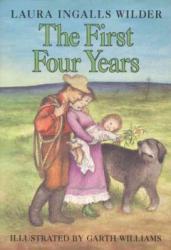
The First Four Years is the last book in the Little House series. It does not read like a Little House Book. The style is completely different, which is probably because it was an unfinished manuscript which Rose, Laura’s daughter, never edited. A notable difference is that Laura never refers to Almanzo by his name; instead, she affectionately calls him “Manly.” Another thing that differs vastly here from the rest of the Little House books is the sheer amount of tragedy and hardship. At the end of the book everything goes wrong in a cascade of unfortunate tragedies. This book reminded me of Laura’s The Long Winter but without the rewarding change in fortune. The very end manages to be optimistic, but in real life things did not immediately get any better for Laura. However, if you are at all interested in the life of the remarkable Mrs. Wilder, this book is worth the read. I would recommend it not as a Little House book, but as more of an autobiography of the real Laura Ingalls Wilder.
Reviewer Grade: 9
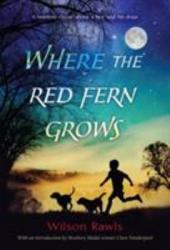
I think that this book is amazing and shares a wonderful message about how a boy has always wanted hunting hound dogs and when he saw an opportunity to get one holds on and wont let go. The author shares wonderful stories of his life with the dogs and then when one dog dies the other won't eat drink or rest and sleep it uses the last of its strength to crawl up to the other dogs grave and when it dies they bury the other dog there. And red fern then grows on top of it and red fern symbolizes that an angel puts red fern on top of the special things who die. And red fern is very rare.
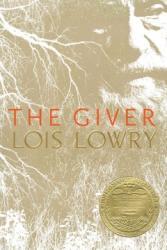
The Giver, written by Lois Lowry, was about a boy named Jonas who is about to turn twelve. Jonas lives in a community where everything is the same and fair, because with any differences it can cause arguments. Because everything is the same, everyone gets bicycles at the same age, gets their job at the Ceremony of Twelve, and is only allowed to have one boy and one girl child in their "family unit". When the Ceremony of Twelve arrives, Jonas has no idea what job he is going to get, but lots of kids his age do. When the day finally comes, he gets told that he has the rarest and highest of honor job there is- he gets to see memories from a long time ago in history. The person training him, or as Jonas calls him, the Giver, gives him memories of a long long time ago when things were way more strange. Everything in his community is the same- that means no colors, animals, and everyone is treated the same.
The Giver shows him some very important memories, and Jonas sets out on a quest to show everyone these memories that he has. I really enjoyed this book, and it was not predictable. A thing that I enjoyed about the book is that it shows how Jonas started to change and act different, for the better, when the Giver gave him more memories.
Reviewer grade: 8
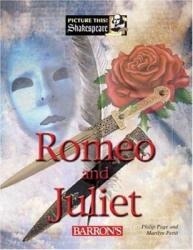
As is likely the case with many readers, I was assigned to study the play "Romeo and Juliet" in a high school English class. While it's true that I was led on to read the book out of obligation, I ended up forming some pretty spirited opinions on the novel. I definitely was not engaged in this read, but even still, am able to respect its excellence in the context of Shakespeare's time.
As a reader, you can tell that the language used is vastly different from that of the common, English vernacular. For this reason, it can sometimes be a challenge to understand what is going on in the plot, especially since the story is told through the lens of a play. Before attempting this read, I would certainly brush up on some basic play terms, to grasp a better understanding of the composition of such a work.
Another factor contributing to the difficulty of this read is Shakespeare’s use of Iambic Pentameter, a rhyming scheme ideal for sonnets where three sets of rhyming quatrains and two lines of rhyming couplets are alternated. I found it truly impressive that Shakespeare manages to devise these rhymes with so much detail and insight. To go through with reading this novel, I would have to suggest to understand the rhyming scene of Iambic Pentameter, as doing so allows you to come to terms with a greater appreciation for Shakespeare’s work.
I found the plot itself to be a bit too inconstant. While at first the novel seems somewhat believable, the ending turns totally wild and unpredictable. I don’t mean to critique Shakespeare’s work, as his play was truly revolutionary for its time, but to a 21st century teen, this novel may not be the most enjoyable.
In terms of the themes, the novel excels with powerful and proactive lessons.
Reflecting on the plot, and Shakespeare’s use of literary devices such as foreshadowing, can lead to meaningful conversations and analyses about life, love, and happiness.
Overall, I would pin my recommendation on this book, but only if you take the time to understand the niche delicacies of Shakespeare’s writing. At face value, the novel may not seem the most exciting or engaging to the reader, but by appreciating the literary masterpiece found in Shakespeare’s work, you’ll definitely enjoy the read!
Reviewer’s Grade Level: 10
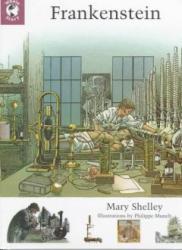
Frankenstein was a disappointment to me. As per the Romantic period, this novel used lots of scenes in nature to explain the characters’ emotional states. I do not mind a few good cries in a storm, but this novel borders on incessant outdoor melodrama. I decided to disregard both the plot and the setting in a vain attempt to enjoy the novel. I would only focus on the characters. As this was written by a female author, I looked forward to the female characters, which were awful. One, Justine, is a servant and seems only to exist in order to die. Elizabeth, who also seems to share this quality, is regarded as an object to be owned in a creepy incestuous manner by her cousin; she is apparently superior and virtuous only because of her noble birth. So, I dismissed the female characters to focus on the males, none of which were believable. Victor, his friend Henry, and his monster all were overly emotional, and they inspired no sympathy from me. With no likable characters and emotions running everywhere, I would only read Frankenstein if required.
Reviewer Grade: 9
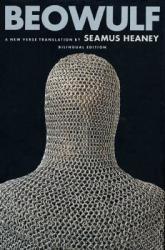
Beowulf is a classic heroic epic written one thousand years ago; I read the version that Seamus Heaney translated into modern English. This translation was excellent, managing to balance the original style and rhythm with a clear and understandable tone. Beowulf is a traditional hero. As a result, some of the plot points are fairly predictable. Nevertheless, I would recommend this epic poem to anyone who enjoys Tolkien or other fantasy series. Reading Beowulf, it is easy to see where more contemporary authors got their inspiration.
Reader Grade: 9
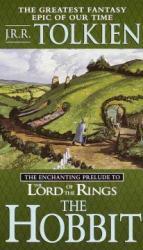
Originally written for his children, J.R.R. Tolkien's fantasy novel “The Hobbit” is hailed among book critics as a remarkable, introductory-level fantasy novel. It manages to engage readers with an epic and timeless plot, while also avoiding the use of profane language and violent scenes.
The tale is set in Middle Earth, home to a number of human-like species including the Hobbits, Dwarves, and Elves. Over the course of the novel, Tolkien provides a rich background of the history of these three species.
Namely, the majority of backstory is setup around the dwarves- who originally inhabited the “Lonely Mountain” and made their fortune off of mining gold. Their empire prospered until at last, a greedy, gold-seeking dragon named “Smog” wreaked havoc to their way of life.
Enter Bilbo Baggings, a middle-aged Hobbit settling down in the Shire. After he hosts a seemingly ordinary dinner party, his life is turned inside out, and the inner spirit of adventure is awakened with him. He joins in a quest to reclaim the dwarf home, and takes part in a number of adventures along the way.
I originally read this book after finishing the “Lord of the Rings” trilogy. While it’s true that this novel is aimed at a younger demographic, it is certainly still an engaging read for older teens and adults. J.R.R. Tolkien embeds a number of rich storytelling devices into his writing, and it makes the read an absolute pleasure!
If you decide not to try this novel, I would suggest reading “A Game of Thrones” by George R.R. Martin. It is certainly not as child-friendly, and has some pretty gruesome scenes, but Martin’s writing makes up for many of the imperfections of Tolkien’s work. Overall, The Hobbit is most aptly suited for readers aged 8-12, and serves as a great introductory novel to fantasy literature. For older readers, I might suggest a different read, but all the same, and in spite of your age demographic, The Hobbit is truly a timeless masterpiece of literature and is worth giving a try!
Reviewer Grade: 10





 Ruth Holley Library will be temporarily closed for approximately one week starting Mon., Dec. 2 to complete roof repairs.
Ruth Holley Library will be temporarily closed for approximately one week starting Mon., Dec. 2 to complete roof repairs.